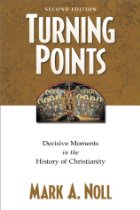
I picked up a book last week which looks wonderfully intriguing and insightful, and if the introduction is any hint of what is to come, it is. The book is called Turning Points: Decisive Moments in the History of Christianity and is written by former Wheaton, now Notre Dame, history professor Mark A. Noll.
The book looks great, but what has stuck with me is a segment of his introduction in which he articulates four reasons for us to study the history of Christianity. I’ll use his words and then comment briefly.
1. In the first instance, studying the history of Christianity provides repeated, concrete demonstration concerning the irreducibly historical character of the Christian faith.
That is, Christianity is if anything the ongoing record of the work of God among people. It is not simply the action of men and women in time. Christianity is God at work among us, and the study of history is the study of his continued work of building his church.
2. A second contribution of church history is to provide perspective on the interpretation of scripture.
To see how Christians in other eras mishandled scripture because of the blinders of their cultural setting and presuppositions breeds in us a humility and care in our own handling of scripture, realizing that we might be no more free of our own cultural biases than our forebears were. This perspective cautions us and demands a greater level of care as we come to the scriptures.
On the other hand, positively, when we face a question of interpretation, or when we face a crisis or decision for which we are looking at scripture, it is helpful to know that others before us have faced that same issue, and a knowledge of history may gives us ears with which to hear their wisdom.
3. The study of church history is also useful as a laboratory for examining Christian interactions with surrounding culture.
We are not the first generation to struggle with how to engage the culture around us without losing the heart of the gospel message. Maybe we can learn how others handled, say, worship music. Or immigration. Or abortion. Or peace and war.
4. …historical study fairly shouts out loud, that God sustains the church despite the church’s own frequent efforts to betray its Savior and its own high calling….
He sees two things here, really, both which should give to modern Christians a deep sense of humility. First we should realize that the riches of our understanding and practice are not newly discovered, but are inherited. We are the heirs of those who have thought deeply, and bled profusely, to bring to us what we know and enjoy.
But secondly, it leads us to look to God with a sense of wonder, and deeper humility, that the church continues through all the error and sin and idiocy which has dogged it throughout its history. Because of God’s providence, it ever shall prevail.
I can’t wait to read the book. Maybe I’ll do that tonight instead of watching the Rays game.
Yeah. Right.
Technorati Tags: History

Geoffsnook
Randy,Thanks for reminder to look at church history. It is a perfect complement to my nostalgia thoughts. I love history, so church history to me is entertaining to read. But it is also devotional to see how God sustains His church. And it is also challenging how His saints have responded to His call over the years. And finally, it is practical, allowing us not repeat mistakes. Nothing new under the sun.
TulipGirl
I’ve added the book to my Amazon wishlist — though I doubt I’ll read it any time soon.However, I really got a lot out of these lectures on Ancient and Medieval Church History, and highly recommend them.